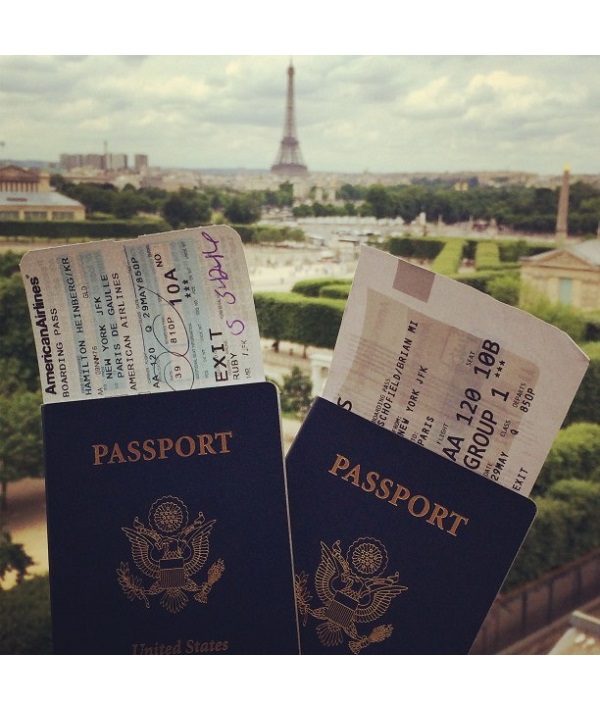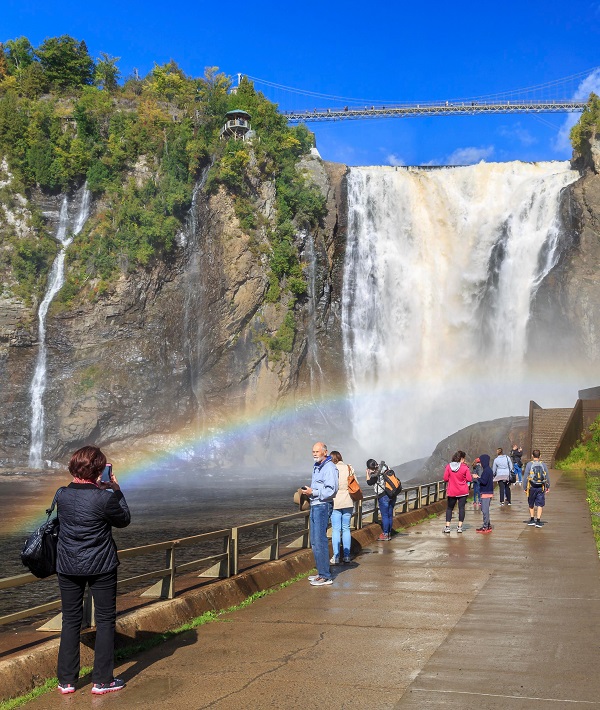
What No One Will Tell You

The countries on this list are some of the most frequented by tourists around the globe. Too often travelers arrive to these places without essential information about local culture, laws and etiquette—facts that could drastically change the course of their future travel plans. Read on to find out need-to-know facts that will open your eyes and prepare you for what to expect before you go to these specific regions.
Image courtesy of @Kristinpagehamilton via Twenty20
Canada

Don't rush to the Canadian border assuming crossing over will be as simple as crossing state lines. Before you visit Canada, you'll need a valid passport and driver's license (if you plan on driving during your stay). Even if that's all good and ready, misdemeanors (like DUIs and other lesser charges, possibly from years ago—even decades in some cases!) can cause you to be denied entry at the border.
Mexico

Tourists in Mexico are often caught off guard when told they shouldn't flush toilet paper, but the news is easier to digest if you know before you go. The sewage systems in place weren't built to accommodate anything more than the obvious. There may be a few places that paper can be flushed, but they're more of an exception to the rule. When in doubt, if there's a wastebasket close to the latrine, stash the paper trash in there.
Nicaragua

Don't board a plane to Nicaragua without first understanding some regional fundamentals. One tidbit that may save a future visitor from sure panic is knowing that electric blackouts are a common occurrence. In recent times, these locally familiar outages have not happened as often as in past years, but suddenly finding yourself in a pitch-black room while in a foreign place can be a jarring experience. In case of an outage, simply stay calm, stay put and wait.
Cuba

Besides being required to have very specific reasons to visit Cuba before booking a flight there, make sure you have enough cash to get you by during most, if not all, of your trip. Most places in Cuba only accept cash, including U.S. currency. If you notice that dual-listed prices for what Americans versus locals pay don't match up, this is normal and comes with the tourist territory. Don't make a scene; just pay the difference.
Jamaica

Reading the headlines about global current events can feel heavy, but one of the more positive progressions around the world is the legalization of same-sex marriage in countries where tolerance had been historically low. Unfortunately, Jamaica is a place where LGBTQ people still have a fight ahead of them and, for now, must practice discretion in public. Being a homosexual in Jamaica isn't against the law, but open displays of affection can get attention from locals and authorities, due to an unequal law. LGBTQ couples traveling to Jamaica should book a room with two beds to be careful.
Dominican Republic

Once you land in the Dominican Republic, you're likely to hear a hearty round of applause from fellow passengers on your flight. Theories of this custom range from locals being elated to arrive back home to people that are just happy the plane landed safely. Whatever the original cause for such celebrations, feel welcome to join in the festivities. You know it's going to be a good vacay if everyone is celebrating before you even get off the plane.
Chile

Standard lunch times vary depending on where in the world you are, but most American-bred tourists are used to looking for this meal somewhere near noon. In Chile, it isn't customary to eat lunch until about 2:00 p.m., so watch out for restaurants having closed doors or limited service near the lunchtime you're used to. Once you do get to your afternoon meal, feast on the fresh and affordable wine and seafood that Chile has plenty of.
Colombia

You won't find many people in the States drinking bags of room temperature milk, but in Colombia you'll blend right in with this choice of beverage. Alqueria, a brand that makes milk that doesn't need refrigeration, is the No. 1 seller of these popular pouches of dairy in the country. This information may be useful to have before you visit Colombia and are offered this well-known drink, only to turn it down because you're wrongly suspicious of the temperature. Live a little and chug a bag of milk!
Brazil

Confused travelers arrive in Brazil for the first time ready to brush off the few Spanish words they know. If you are a fluent Spanish speaker, you'll hear hints of familiarity in Portuguese, Brazil's official language, but you'll most likely still have to listen closely to the distinctively different dialect. The two languages are similar enough that even if one person speaks Spanish and the other Portuguese, a general exchange and mutual comprehension can be made. For travelers who speak only English, learn a few phrases in the regional language to broaden your voyager vocabulary.
Argentina

Budget-savvy tourists flock to South America for the potential to have a great big adventure on a teeny little budget. For the most part, smart spenders can easily stay under the budget of $50 a day, per person in various cities throughout the country. However, Argentina is a country known for high inflation rates and an overall volatile economy. Those expecting bargains on their South American trip can drain their budget early on without being properly prepared for local prices, compared with neighboring countries.
England

It seems safe to assume that since you drive on the left in England, you should walk and stand to the left as a pedestrian to match the national flow of traffic. It turns out you should never, ever stand to the left in public or while taking the tube. Especially on the underground escalators that line the subway stations, you'll notice everyone standing to the right, allowing busy commuters a "carpool style" express lane.
Ireland

Before booking a rental car in Ireland, there are three key factors to remember about driving there: Stay to the left (as in the U.K.), prepare to be confused by clusters of road signs and directions from locals trying to be helpful will just further distract you from finding where you're trying to go. As a result, expect to get lost quite a bit. So much of Ireland is rural—you'll grow to the bountiful meadows, fields and peaceful drives through nowhere.
Spain

Mealtimes in Spain may be hard to keep up with for American tourists. Spaniards eat all throughout the day and pretty late into the night, with dinner taking place between 8 p.m. and midnight. With a second breakfast and la merienda, a mid-afternoon snack to hold you until dinner, there should be no complaints from foodies. Adjust your plans according to local meal times so that you're full of energy and ready to go at the right times.
France

You never know what to expect when it comes to tap water in other countries. Fortunately, France has safe and drinkable water, a good thing for travelers looking to save money on their trip. In cafes and restaurants, if you don't specifically ask for tap water, you're likely to get charged for the bottled water they assumed you wanted poured. Don't feel targeted as a tourist, since this is common practice for all.
Germany

Public restrooms are often kept in poor conditions, but they're a necessary part of life. Visitors to Germany can expect much tidier public facilities, but at what cost? At these bathrooms, noticeably cleaner than the average American public toilet, there is usually an attendant or machine to collect the mandatory fee (about half a Euro). Before you scoff at the price to potty, know that you can expect a much more comfortable experience. It's not the worst half buck you'll ever spend, but be sure to keep change on you at all times, just in case.
Hungary

Hungarians are extremely proud of their local wines, and they're not afraid to let you know it. If you are planning a homestay, or possibly socializing with locals, let them steer you in the way of wine suggestions. Hungary is famous for its wine regions, like Tokaji, so there's no one like a local to recommend the best tastes of the country. You'll have a better time because of it.
Image courtesy of @DOUGZIESMedia via Twenty20
Russia

It can be tempting to engage in a conversation about Russia even before you leave the U.S., but if you plan a trip to the massive country, get all that out of your system before boarding your flight. Russia is a politically charged place, and while visiting you will certainly be asked about where you stand on certain issues. Play dumb and don't get caught up in the conversation. There will be bottles of vodka everywhere, and a bit too much can make you loose-lipped. Do your best to stay quiet on politics while there.
Morocco

When it comes to tipping around the world, every region has various expectations regarding who gets what. In Morocco, expect to give anyone who helps you with a service (i.e., bellboys, taxi drivers, tour guides) a small tip. Leaving a little extra at cafes and restaurants will earn you favor with locals, especially if you plan on returning to an eatery or street food stall more than once while you're visiting.
Egypt

For those who thought Egypt was too expensive or dangerous to visit, we've got news for you—it's neither. Especially near tourist hotspots, the nation has reasonably priced lodging and food options that work with any budget. Other expenses will only call for a few of your dollars per day, which stretches much further when converted to the Egyptian Pound. Stick with group-based tours and Uber rides to avoid standing out as an obvious target for muggers, and you can stay worry-free amid ancient history.
Kenya

Part of the reason you travel at all is for the numerous photos you capture while on vacation. Ahead of any future trip to Kenya, however, you might want to slow down on the selfies and snaps. Taking photos of protected places and people, such as the president or specific government buildings, is strictly prohibited. Even if you just want to take a picture with/of a Kenyan, ask before clicking (offering a tiny tip will get you a pic).
South Africa

Although there is only an actual water crisis in Cape Town, South Africa has experienced a severe water shortage, ultimately beating one of the worst droughts in its known history. Towns such as Johannesburg can drink and use water as they normally would, but residents of Cape Town are assigned a daily cap on how much water they can use in order to preserve what's left in the reservoirs. South Africa still encourages tourism, stating that the low level of tourists compared to the overall population doesn't drastically affect the water supply.
United Arab Emirates

It's not illegal to drink in the United Arab Emirates (UAE), where the recently popularized destination Dubai is located, but it is against the law to be inebriated in public. Drinks are served at hotels and casinos, but visitors will want to enjoy the bulk of their adult beverages inside. It is possible for you to be arrested, even as a foreigner visiting for a short time, for ignoring this law. Educate yourself before heading to UAE so you don't end up on a docu-series like "Locked Up Abroad."
India

The term "Delhi Belly" is one that you may hear related to food illnesses picked up while visiting India. Meals are plentiful and cheap, but if you're mainly indulging in snacks from street stalls, where there are little to no health standards, you should expect a stay filled with uncomfortable bathroom breaks. Drink bottled water only, eat foods that have been boiled or fried, and enjoy produce with skin that can be peeled. Because the food is so different than what your body is used to, a bit of "extra activity" is to be expected, but there's no need to get sick if it can be avoided.
China

In China, sites like Google, Instagram, YouTube and Facebook are blocked for everyone without a dedicated VPN (verified private network). Recently, VPNs have been banned (although some companies claim their services still work). This information is handy to have before arriving, especially if you're planning to post to social media during your vacation. Just to be on the safe side, plan to take a breather from the 'net and wait until you fly back home to update your accounts.
South Korea

A convenient restaurant-serving system you should know about exists in South Korea. In large cities, like Seoul, it's hard to locate a place to eat that doesn't have a handy call button on the corner of the table. These easy little push-points summon your waiter, some with specific mini-buttons to call for a glass of water or the bill. Make sure to check around your table before calling for the bill. Typically, it's discreetly been placed on your table.
Japan

No doubt you're somewhat familiar with this part of Japanese culture: the bow. Prior to arriving in the beautiful island country, think about practicing your own bow. Japanese people are very polite and considerate, bowing to one another as a show of respect for even the briefest interactions, with certain angles and depths of bows signaling different meanings. Failing to master the art of bowing may come off as rude, so have a bow-off with a friend to feel like a pro before you go.
Thailand

In the mostly Buddhist-populated Thailand, travelers can show cultural awareness and appreciation by knowing a few key fundamentals. A good place to begin is with the significance of the head, hands and feet. Never point your fingers at someone, and especially avoid pointing your toes or showing the bottoms of your feet (Thai people consider this the filthiest part of the body). The head is considered sacred, where the most important parts of a spirit lives, so be careful to avoid touching this sensitive area. If you accidentally make contact with these body parts, apologize profusely to display concern and respect.
Vietnam

Americans will need a visa to enter Vietnam, but many travelers book their flights without understanding the admittedly confusing process. Thankfully, there are third-party companies you can book with online and they can navigate the trickiest parts of paperwork for you (for an affordable fee). Whatever you do, make sure everything is in order to avoid getting turned away at the airport, sometimes before even boarding your flight!
Indonesia

Beware the wrath of taxi drivers in Indonesia who catch you using ride-share apps, like Uber and Grab. Especially in tourist-heavy cities like Bali, cab drivers feel strongly about how they believe ride-sharing apps steal from the local community without giving back (even though many of the app's drivers are citizens of Indonesia). The unfortunate trade-off is that the price difference is usually very noticeable, with taxis seemingly overpriced. Visitors should know about the ongoing tension before traveling to the country, and be discreet if ride-sharing is your chosen mode of transportation.
Image courtesy of @lindsayjubeck via Twenty20
Australia

Because it has hundreds of species that can't be found anywhere else on Earth, it's understandable to be drawn to the extensive and exotic wildlife in Australia. Before flying to "The Land Down Under" and handing out treats to interesting critters, consider being less interactive and only observing the animals, not feeding them. Tourists aren't as familiar with the eating habits of local animals and sometimes offer food that alters their behavior. It's the safest bet to avoid handing out morsels to marsupials.
Image courtesy of @picture_ck via Twenty20
New Zealand

Kiwis, the affectionate nickname for people from New Zealand, are a hospitable bunch. When it comes to tourists, they want to ensure each visitor is having an amazing time, so don't be surprised when you're repeatedly asked by locals how your trip is going. Kiwis will even generously offer up info about their favorite spots to whoever want to know—so, ask! These are locales that are usually kept secret from tourists. Be ready to absorb the host-like energy of everyone you meet as they welcome you to their homeland.




